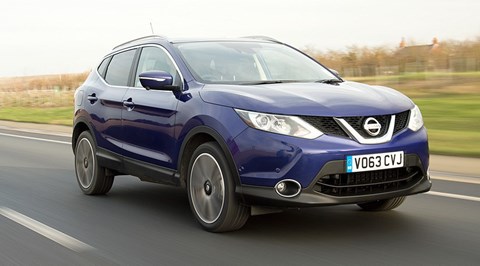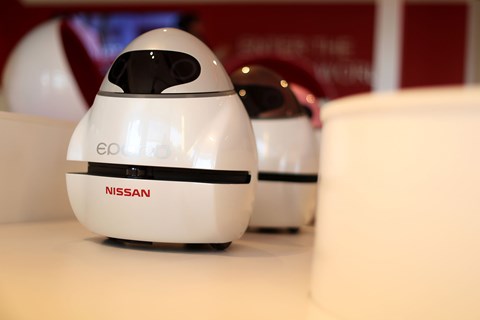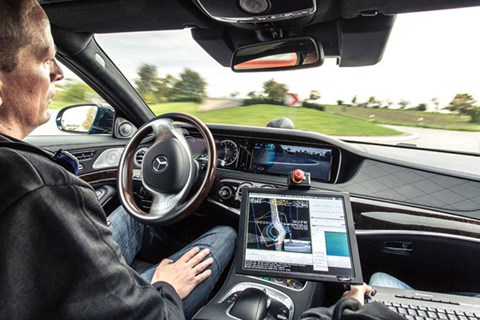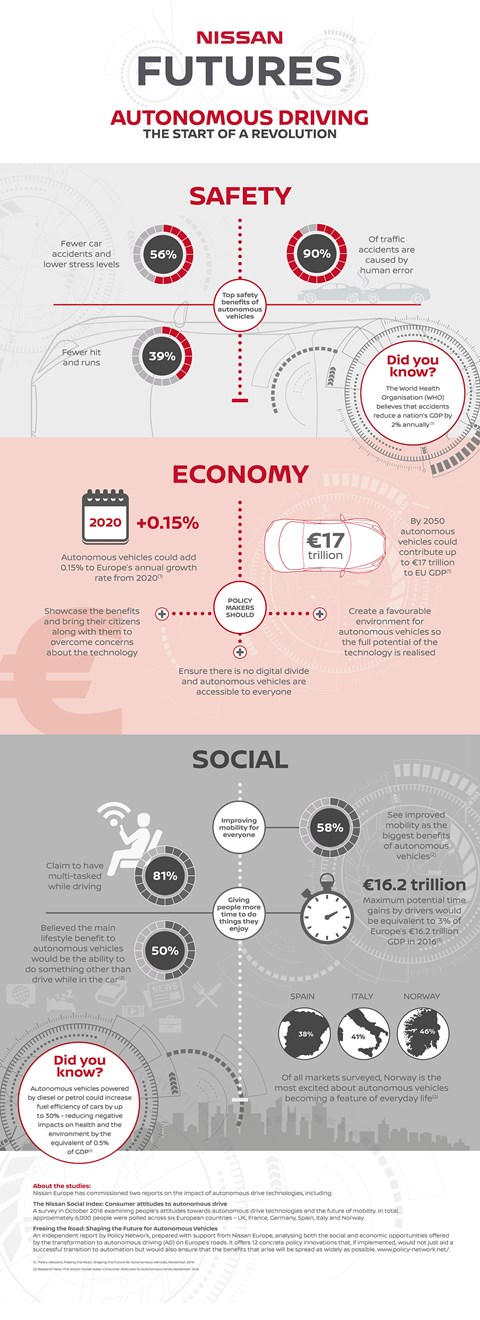► 2017 Qashqai starts Nissan’s autonomous drive revolution
► 2018 will see introduction of autonomous overtaking
► But fully self-driving cars? That’s a different matter entirely…
Nissan has revealed more of its plans to bring self-driving cars to the masses, saying the technology has the potential to revolutionise society – and add some 17 trillion euros to European GDP by 2050. But the firm’s ex-NASA guru leading development of the necessary artificial intelligence has told CAR that a fully autonomous vehicle (AV) is still ‘at least 10 years away’.
How autonomous will the 2017 Nissan Qashqai really be?
Nissan’s major shtick surrounding this tech is that it wants to make it available ‘for everyone’. To this end it’s already launched its first ProPilot system on the Serena in Japan; it’s this system that will be coming to the Qashqai in Europe in 2017. Since the Qashqai is by far and away Nissan Europe’s most popular model, you can see how it can claim an egalitarian impact.
However, this ‘first generation’ ProPilot is similar to the various ‘traffic jam assistants’ that are already available from a number of German car brands. Essentially it expands the capability of the adaptive cruise control by tracking the vehicle ahead, allowing it to bring the Qashqai to a complete halt when the traffic stops moving, and then start it going again as the congestion eases.
While this will certainly take some of the stress out of stop-start situations – assuming it behaves in a manner people are willing to trust, on which more in a moment – it’s hardly the stuff that unlimited social media surfing is made of. And no-one at Nissan is yet prepared to say whether ProPilot will be fitted as standard on any Qashqai trim levels, nor how much it is likely to cost.

Oh dear. My firework appears to have gone out…
Indeed. But things do get a little more interesting in 2018, when the second generation ProPilot system is due to arrive.
Gen-two will have lane changing ability. You can, of course, already do this in a Tesla – put the indicator on and a suitably-equipped Model S will check its blindspots and move into the next lane without you having to lay a finger on the steering wheel.
However, we’re given to understand that Nissan’s system will go further than this by identifying slower vehicles ahead and moving out to pass them – all by its lonesome. It will then move back into the original lane, thus ending the utter irritation of poor motorway lane discipline in one fell swoop.
Or rather, once similar systems have propagated out into all the other cars on the road…

So what about 2020 – is that still set to be a milestone in the AV revolution?
2020 has always been the target point for proper autonomous driving for Nissan. And by this time the firm remains bullish that it will have an AV on sale that can negotiate city centres and intersections without frying its chips.
The intent is certainly there. The team working across the Renault-Nissan Alliance to achieve it comprises not just automotive engineers but social scientists (anthropologists, sociologists and psychologists) and software geniuses as well. This is important, because to be successful – or simply ‘not annoying,’ as the director of Nissan’s Silicon Valley research centre Dr Maarten Sierhuis puts it – these autonomous vehicles are going to need to understand and participate in the social conventions of driving that we humans all take for granted. Those conventions are different all around the globe, sometimes from place to place within the same city environment.
So while Nissan may well have a car on sale in 2020 that can deal with reasonably complex traffic situations by itself, the chances are you’re still going to have to be sitting there, with a steering wheel in front of you, ready to step in should the situation go beyond the vehicle’s ability to comprehend and deal with it.
Boo, hiss, etc. Why is this?
Put the artificial intelligence aspect to one side for a moment and think about the hardware. Think about the sheer amount of data the vehicle is going to have to process in order to deal with the variables, understanding where it is on the road and what it’s supposed to be doing.
As Sierhaus reminded us, the cars that will be on sale in 2020 are going into development now, and at the moment we simply don’t have the mobile computing power necessary. Add in the fallibility of radar and lidar in poor weather, the not-quite-there-yet lack of high-resolution mapping and other similar issues, and although the cars of 2020 will certainly be clever, they won’t be negotiating London in rush hour without our input.
Hence Sierhuis, who was responsible for building autonomous systems that advise astronauts on spacewalks while he was at NASA, rather candidly explained we are still ‘at least 10 years away’ from full vehicle autonomy.

So where do the 17tr euros come in?
Ah. That’s a bit of provocation from a think tank called Policy Network, which Nissan commissioned to do a report entitled ‘Freeing the Road: Shaping the future for autonomous vehicles’. It reckons that if we get autonomous cars right, they have the potential to literally transform society.
Think of all the mobility-challenged people who will suddenly be able to go wherever they want – think of all the things our autonomous cars can be doing while we’re not using them. Collecting and delivering a few parcels for Amazon, perhaps. Or simply carrying other people around, earning money when they’d otherwise be idle.
There are challenges here, too, of course. Taxi drivers are basically going to go extinct – and possibly motoring journalists as well. New patterns of vehicle ownership may emerge (every carmaker under the sun is currently desperate to get car sharing schemes off the ground, Nissan included). The success of alternative fuels – particularly electric – seems to be taken as a given.
But quite a lot of this relies on sensible decisions being taken in a timely fashion by policymakers and legislators. Getting that to happen feels like it would make programming an artificially intelligent self-driving car look like a doddle.
Read more Tech news here
